MercoPress. South Atlantic News Agency
Tag: Irfaan Ali
-
Monday, December 18th 2023 - 10:41 UTC
Brazilian diplomacy manages to cool tensions between Venezuela and Guyana
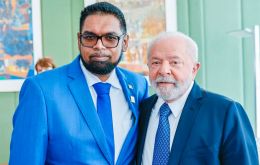
In what is considered a success for Brazilian diplomacy, Venezuela and Guyana pledged in a joint statement last Thursday, not to resort to force to settle a long-standing dispute over contested land and adjoining sea in an oil and gas-rich region known as the Essequibo.
-
Friday, December 15th 2023 - 10:32 UTC
Venezuela and Guyana not to use force over Essequibo dispute
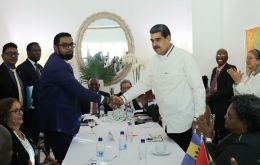
Presidents Nicolás Maduro of Venezuela and Irfaan Ali of Guyana agreed Thursday in St. Vincent and the Grenadines not to threaten each other or use force in any circumstances. The 11-topic understanding was reached in the first round of talks brokered by host Prime Minister Ralph Gonsalves as president pro-tempore of the Community of Latin American and Caribbean States (Celac).
-
Tuesday, December 12th 2023 - 10:22 UTC
Presidents of Venezuela and Guyana prepare for Thursday's talks

Venezuelan President Nicolás Maduro insisted Monday that next Thursday's talks in St Vicent and the Grenadines between him and his Guyanese colleague Irfaan Ali were the direct result of the Dec. 3 referendum and, hence, an achievement of the Venezuelan people.
-
Tuesday, December 12th 2023 - 10:13 UTC
Essequibo conflict: Brazil sending observer to Maduro-Ali meeting
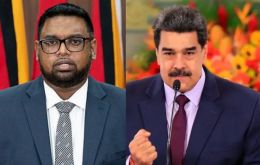
The Brazilian Government of President Luiz Inácio Lula a Silva shall be sending a delegation headed by former Foreign Minister and current presidential advisor on international affairs Celso Amorim to Thursday's meeting between the leaders of Guyana and Venezuelan in St Vincent and the Grenadines to discuss the Guiana Essequiba issue, it was reported in Brasilia.
-
Saturday, December 9th 2023 - 10:26 UTC
Essequibo: Guyanese president hopes Maduro will not act recklessly

Guyanese President Irfaan Ali said that Venezuela's latest actions regarding the dispute over the Guaiana Essequiba were “a regional threat” and hoped Nicolás Maduro's regime would not act “in an adventurous and very irresponsible manner.”
-
Saturday, December 2nd 2023 - 20:14 UTC
Venezuela ignores UN ICJ ruling and will go ahead with a referendum on Guyana's Esequibo
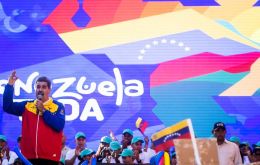
Venezuela will press on with a weekend referendum over the fate of a vast disputed area in the Esequibo region it claims, disputing neighboring Guyana's jurisdiction, despite the UN International Court of Justice, ICJ, Friday ruling urging restraint in the dispute.
-
Friday, April 7th 2023 - 10:07 UTC
New ICJ ruling against Venezuela in Essequibo case
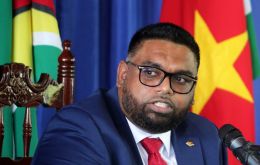
The Venezuelan administration of President Nicolás Maduro was dealt another international setback Thursday when the International Court of Justice (ICJ) on Thursday turned down new objections filed by Caracas regarding the territorial dispute with Guyana over the oil-rich Essequibo.
-
Tuesday, December 13th 2022 - 09:14 UTC
Guyana opens offshore oil bidding round to diversify explorers and expand the state role
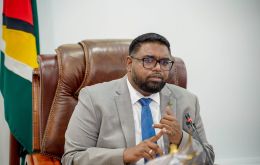
The Cooperative Republic of Guyana opened a bidding round for 14 oil and gas blocks in its oil-rich offshore, hoping to award exploration contracts by the end of May. Guyana has become home to one of the largest oil discoveries in the last decade, with about 11 billion barrels of oil and gas found by a consortium led by Exxon Mobil.
-
Monday, January 31st 2022 - 09:51 UTC
Brazil wants to team Guyana and Suriname oil and gas in a regional energy corridor

Brazil is betting strongly to become the main player in the development of oil and gas production in its northeast corner, where the state of Amapá shares proximity with French Guiana, Suriname, and Guyana, these two of which are set to become significant players in the hydrocarbons business.
-
Monday, August 3rd 2020 - 10:36 UTC
Winner of March presidential election takes office in oil-rich Guyana

Guyana's elections commission on Sunday declared opposition presidential candidate Irfaan Ali the winner of a disputed Mar 2 election, paving the way for a change in power in the newly oil-producing South American country.
